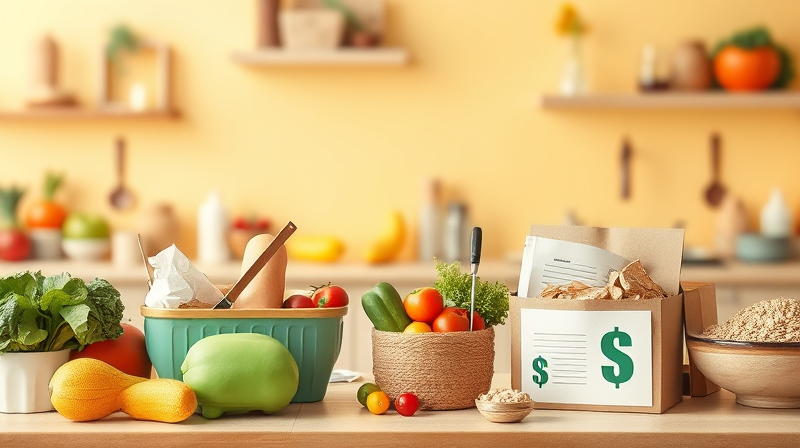Bulk buying is emerging as an essential strategy for households who want to not only save money but also embrace a more sustainable lifestyle. By opting to purchase larger quantities of everyday items, you can streamline your grocery shopping experience, optimize wastage, and cushion your wallet against rising expenses.
Bulk buying works on the principle of efficiency. When you buy more, you often pay less per unit, which in the long run means substantial savings. Moreover, buying in bulk significantly reduces the amount of packaging waste, promoting an eco-friendly shopping habit. This article unfolds the benefits of bulk buying and shares practical tips to help you implement this strategy effectively at home.
Understanding the Benefits
One of the main driving forces behind bulk buying is its potential for remarkable cost savings. When you purchase items like grains, beans, and spices in large quantities, you enjoy a lower price per unit. This means your overall grocery bill shrinks considerably over time.
Furthermore, bulk buying is a powerful ally in the fight against waste. By purchasing items in larger quantities, you minimize the excessive packaging that contributes to landfill overflow. Fewer plastic and cardboard packages mean a lower environmental impact. Many households have learned that a few proactive changes in their buying habits can contribute significantly to eco-friendly initiatives.
Lastly, the element of convenience cannot be overstated. When you stock up on non-perishable staples such as pasta, rice, or canned foods, you save many shopping trips. This convenience, combined with lower grocery expenses, creates a win-win situation for both your schedule and your bank balance.
Practical Tips for Smart Bulk Buying
- Plan Ahead and Assess Your Needs: Begin by listing the items you consume frequently. Focus on non-perishable goods with long shelf lives. This proactive planning ensures you buy only what you can use before items expire, avoiding potential waste.
- Invest in Proper Storage Solutions: Whether it’s airtight containers, reusable jars, or proper freezers, good storage is vital. Label items with purchase and expiration dates and adopt a first-in, first-out approach to ensure nothing is wasted.
- Portion and Share: If the quantities are too large, consider subdividing them into daily-use portions. Another brilliant option is to share the surplus with family or friends. This not only prevents waste but also spreads the financial benefits of bulk buying.
- Avoid Common Pitfalls: Watch out for enticing deals that may not be as cost-effective as they appear. Items that spoil quickly or have misleading packaging may end up costing more and contributing to waste.
These smart tips form the backbone of successful bulk shopping, ensuring you maximize benefits while sidestepping potential setbacks.
Eco-Friendly Opportunities When Buying in Bulk
Eco-conscious shoppers are increasingly drawn to bulk buying as a way to reduce environmental damage. By purchasing in bulk, you minimize the need for single-use packaging materials, which are often responsible for a significant amount of environmental degradation.
Many stores now encourage customers to bring their own containers or jars to fill with the desired bulk items, a practice that further cuts down on waste. Whether it’s pantry staples, cleaning supplies, or even toiletries, the waste reduction achieved through this method is impressive.
Moreover, the sustainability of bulk buying extends beyond food. Bulk cleaning supplies and personal care items can also be purchased this way, decreasing the dependency on products that come in disposable packaging. This shift not only supports your household budget but also fortifies your contribution to a cleaner environment.
Best Items to Stock Up On
When it comes to bulk buying, certain products offer the greatest benefits. Below is a carefully curated list of items that are ideal for bulk purchases:
- Pantry Staples: Items such as rice, beans, pasta, flour, sugar, and spices are perfect candidates. They often have long shelf lives and form the base of many recipes.
- Proteins: Bulk purchasing proteins like chicken, ground beef, or even fish can be economical if you plan to portion them and store them in the freezer for extended periods.
- Snacks and Baking Essentials: Nuts, dried fruits, and other baking essentials allow for creative cooking while maintaining cost-effectiveness.
- Household Items: Stock up on paper products, detergents, and cleaning supplies to reduce the frequency of your shopping trips.
Keeping this list handy can guide your bulk buying decisions and ensure you are always investing in items that offer durability, usability, and savings.
Effective Meal Planning to Complement Bulk Buying
One of the simplest yet most effective strategies to optimize your bulk buying efforts is meal planning. When you plan your whole week or even month around the items you have purchased in bulk, you can ensure that nothing is wasted.
For example, if you have bought a large bag of rice, try incorporating it into several meals throughout the week. Stir-fries, soups, casseroles, and even rice salads can be part of a diverse and nutritious menu. This planning not only maximizes your purchase value but also minimizes the likelihood of food spoiling unused.
The key takeaway from these strategies is that with meticulous planning and a focus on sustainability, bulk buying can be a transformative habit for your household. Combining economic savings with eco-friendly practices makes this an inspiring and practical approach for anyone eager to make a positive change.
Embark on your bulk buying journey with a clear plan, stay organized with proper storage, and enjoy the dual benefits of saving money and supporting the environment. By integrating these smart strategies into your daily routine, you not only invest in your household’s future but also contribute to a healthier planet.







